The Daily Bulletin is published by Internal and Leadership Communications, part of University Communications
Contact us at bulletin@uwaterloo.ca
Submission guidelines
Editor:
Brandon Sweet
University Communications
bulletin@uwaterloo.ca
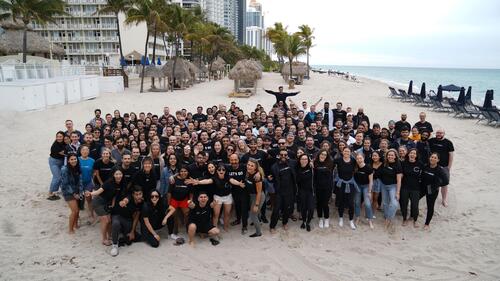
By Melanie Scott. This article was originally published on Waterloo News.
From about the age of 10, Andrew D’Souza (BASc ’08) began to think of inventive ways to earn money. An early entrepreneur, whose family immigrated to Canada from India, D’Souza started providing services like paper-delivery, lawn mowing and dog walking to his neighbours. Later, he took on part-time jobs to save for university because he wanted to avoid debt. Today, D’Souza is the co-founder and CEO of Clearco, a Toronto-based fintech company that has invested $2.2 billion into 5.5 thousand ecommerce companies.
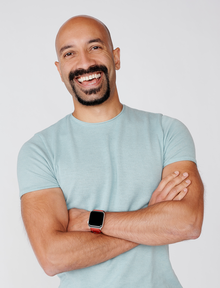
> Andrew D'Souza (BASc ’08)
> Co-founder and CEO, Clearco
When he enrolled in the Systems Design Engineering program at Waterloo, D’Souza imagined a career building and designing cars. A big draw for him to Waterloo was the co-op program because it allowed him to try different work placements alongside his classroom learning. Through his placements, D’Souza was able to narrow in on his career interests. He found he was not inspired by the career trajectory in the automotive industry, and when he completed a co-op term at McKinsey, a management consulting firm, he discovered that he enjoyed developing strategy, but missed the accountability of building a product. With these realizations, D’Souza decided entrepreneurship might be a good fit. Drawn to the tech-startup sphere, he accepted an invitation from Chamath Palihapitiya (BASc ‘99), an early senior executive at Facebook and the founder of Social Capital, to work at a startup in Silicon Valley after graduation.
“When choosing a career path, continue to understand what gives you energy and what you find interesting and lean into those things,” D’Souza says. “Ask yourself what is the impact you really want to leave on the world. With entrepreneurship, there are a lot of setbacks, but if you’re doing something because you’re passionate about it, you’ll be a lot more resilient.”
Though D’Souza later became the COO of education startup, TopHat and the president of Nymi, a wearable platform focused on identity and security, it was his time in Silicon Valley that led to the idea behind Clearco.
D’Souza noticed that entrepreneurs in Silicon Valley were advantaged, not because of superior ideas, but because of their location, education and access to investors. He believed there should be a better, more accessible way for startups to get funding. Seeking to level the playing field for entrepreneurs, Clearco has pioneered a funding model that removes biases by using data science. Co-founded in 2015 with Michelle Romanow, a Canadian tech entrepreneur known for her season on the cast of CBC’s Dragon’s Den, Clearco’s mission is to open up opportunities for entrepreneurs who operate online, no matter their journey, location or business solution.
While traditional Venture Capital (VC) funding relies on pitches and networking and retains equity, Clearco uses AI technology to collect data to evaluate a company’s eligibility for investment and does not take ownership or control. Instead, the investment is paid back through a small percentage of the company’s revenue along with a minimum 6 per cent return. Traditional VC models can take many months to make decisions, but Clearco’s algorithm takes less than 20 minutes before it determines whether an investment can be made and how much.
Bias in traditional funding models is common. Crunchbase reported that startups with all-female founders drew just 3.4 per cent of all venture capital dollars in the U.S. in 2019, and that declined to 2.4 per cent in 2020. D’Souza suggests these low numbers may be because many female entrepreneurs are solving problems they face in the world, but in pitch meetings men, who may not relate to their ideas, make up the majority of VCs. Clearco funds eight times more women than traditional VC funding and 30 per cent of their entrepreneurs are People of Colour. They also focus on being accessible to entrepreneurs who may be far from networking opportunities offered in major cities.
“If you only fund entrepreneurs that look a certain way and only invest in certain types of companies, the result is homogeneous companies that benefit a singular group,” says D’Souza. “But if you enable diversity of founders, companies and ideas, the world will look much better, whether it’s improvements to healthcare or sustainability solutions, every entrepreneur has their own vision, but they need support and resources to get off the ground.”
Earlier this year, Clearco reached unicorn status, a designation for tech startups that achieve valuations of $1 billion US. While the company began by offering more accessible funding for startups, Clearco plans to position itself as a partner for online entrepreneurs, packaging data and providing founders with everything they need to succeed.
Clearco hires Waterloo co-op students, and currently has a number of full-time positions available on their careers page.
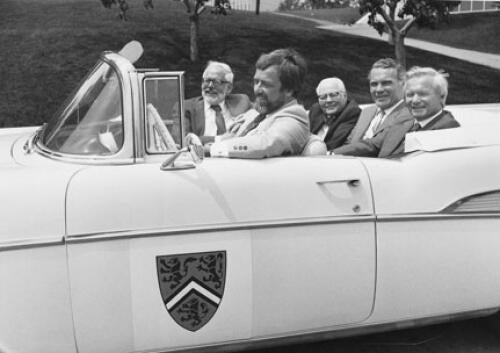
Then-Premier Bill Davis sits next to former presidents Burt Matthews and Gerry Hagey, with Doug Wright riding shotgun in a ’57 Chevy driven by Steve Little, chair of the University’s 25th anniversary committee, celebrating the University's 25th anniversary in 1982.
The Honourable Bill Davis, former Premier of Ontario, died last week at the age of 92. Davis’s relationship with the University of Waterloo and the overall accomplishments resulting from the Davis era are important and significant in the unique development of this University.
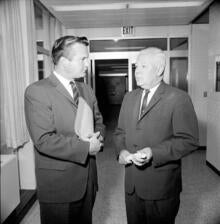 William G. Davis, Education Minister, with President J.G. Hagey at the University of Waterloo on August 19, 1963.
William G. Davis, Education Minister, with President J.G. Hagey at the University of Waterloo on August 19, 1963.
A graduate of the University of Toronto and Osgoode Hall Law School, Davis practiced law before entering politics, elected to the Ontario legislature at the age of 29 in 1959, serving first as a backbencher in Leslie Frost’s Progressive Conservative government. Under Premier John Robarts, Davis was named Minister of Education in 1962, and took on the portfolio of Minister of University Affairs in 1964. During his tenure, Davis made a number of transformative changes to the province’s elementary, secondary and post-secondary education systems that included the consolidation of school boards and the establishment of a number of new universities including Trent, Brock, Laurentian, York, and Erindale College (later the University of Toronto Mississauga), and Ontario’s Institute for Studies in Education (OISE). In addition, he oversaw the creation of Ontario’s community college system.
In March 1965, as Minister of University Affairs, Davis presided over the official openings of the Earth Sciences & Chemistry (ESC) and Biology 1 (B1) on the University of Waterloo’s campus.
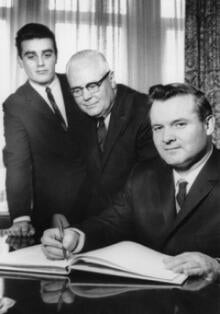 President Gerry Hagey and alumni representative Peter Barnes look on as Minister of University Affairs Bill Davis signs the official University of Waterloo guestbook at the grand opening ceremony of ESC and B1, March 1965.
President Gerry Hagey and alumni representative Peter Barnes look on as Minister of University Affairs Bill Davis signs the official University of Waterloo guestbook at the grand opening ceremony of ESC and B1, March 1965.
Davis’s decision to approve the massive computer installation of an IBM System/360 Model 75 as “furnishings” to be paid for from the capital grant for the new Mathematics and Computer Building, an idea suggested by Wes Graham, Davis’s former class-mate at the University of Toronto, ultimately gave Waterloo the largest computer system in Canada, confirming the University’s international reputation in the field of Computer Science.
His interest in the education portfolio led Davis to author a number of publications including “The Government of Ontario and the Universities of the Province” (Frank Gerstein Lectures, York University.), 1966; “Education in Ontario”, 1965; “Building an Educated Society 1816-1964”, 1966; “Education for New Times”, 1967.
In 1971, Davis succeeded Robarts as Ontario’s 18th Premier, serving in that role for 14 years. Premier Davis played a key role in the repatriation of Canada’s Constitution in 1982.
When Waterloo’s then-Dean of Engineering Doug Wright left the University for a deputy minister’s post at Queen’s Park, Davis put him in charge of the province’s Committee on University Affairs which dramatically amended the system of university funding and made possible the equitable growth of Ontario’s newer universities.
Davis received an Honorary Degree from the University of Waterloo in 1982 as part of the University of Waterloo’s 25th anniversary celebrations.
A strong supporter of the University of Waterloo, Bill Davis’s legacy on campus came in the form of the sprawling computer research building that bears his name.
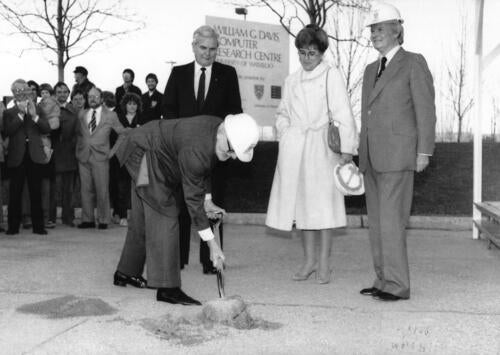
Groundbreaking of the William G. Davis Computer Research Centre, now known colloquially as the Davis Centre, with guest of honour, Bill Davis in attendance (April 16, 1985).
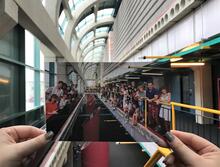 President Doug Wright had managed to convince Davis of the need for a state-of-the-art computer research centre on campus, and construction began in May 1984. The provincial government’s green light for this project was no small win for Wright and Waterloo, because at the time there was a moratorium on new university buildings across Ontario. The project received a $31.1 million grant from the province of Ontario in 1984, a large portion of the computer research building’s $50M price tag. The building, which would house the Institute for Computer Research (ICR), the departments of electrical engineering and systems design engineering and the department (later School) of computer science, as well as a branch of the University library, was 300,000 square feet in size and featured concrete and glass gallerias that were as long as a football field, with two 250-seat lecture halls suspended on the outside of the building by massive girders. The design by IKOY consultants and architects Mathers and Haldenby evoked the “visual world of the computer monitor”, and made use of a great deal of natural light, combined with low-contrast indirect lighting.
President Doug Wright had managed to convince Davis of the need for a state-of-the-art computer research centre on campus, and construction began in May 1984. The provincial government’s green light for this project was no small win for Wright and Waterloo, because at the time there was a moratorium on new university buildings across Ontario. The project received a $31.1 million grant from the province of Ontario in 1984, a large portion of the computer research building’s $50M price tag. The building, which would house the Institute for Computer Research (ICR), the departments of electrical engineering and systems design engineering and the department (later School) of computer science, as well as a branch of the University library, was 300,000 square feet in size and featured concrete and glass gallerias that were as long as a football field, with two 250-seat lecture halls suspended on the outside of the building by massive girders. The design by IKOY consultants and architects Mathers and Haldenby evoked the “visual world of the computer monitor”, and made use of a great deal of natural light, combined with low-contrast indirect lighting.
The Davis Centre opened in November 1988 to great fanfare, with the former premier on hand (he had retired in 1985) as a guest of honour, sharing the stage with then-current Liberal Premier David Peterson.
In 1987, Davis was made an Honorary Senior Fellow of Renison University College.
Spending more than three decades in retirement, Davis became something of an elder statesman in Ontario politics and was well-regarded across the political spectrum. In 2004 he sat on the advisory panel of the “Rae Review” of Ontario’s post-secondary education system led by former Premier Bob Rae.
Davis was a member of the Queen's Privy Council of Canada, a Companion of the Order of Canada, and was among the first cohort to be invested into the Order of Ontario. He was appointed as a Knight in the Legion of Honour of France.
He is survived by his wife Kathleen, his five children, 11 grandchildren and 3 great-grandchildren.

The Centre for Ocular Research & Education (CORE) is seeking daily disposable contact lens wearers who experience discomfort with their lenses for a 5-night study using a gel lubricant. Receive $690 upon study completion. Learn more at the study's website.
All studies conducted at CORE have been reviewed and received ethics clearance through a University of Waterloo Research Ethics Committee. To be the first to know about new CORE studies make a participant profile at https://prescreen.uwaterloo.ca/star_tracker/index.php/volunteers.
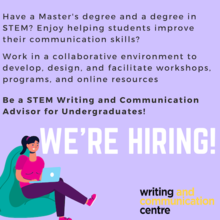 The Writing and Communication Centre (WCC) is currently seeking a STEM Writing and Communication Advisor for undergraduates. "They ensure that principles of equity, specifically related to language and linguistic equity, are upheld in all aspects of teaching and support while promoting writers’ agency," says a note from the WCC. "Use a range of research-supported pedagogical strategies to teach and support undergraduate students in individual and group appointments. Work in a collaborative environment to develop, design, and facilitate workshops, programs, and online resources to teach communication skills and strategies, especially in STEM fields."
The Writing and Communication Centre (WCC) is currently seeking a STEM Writing and Communication Advisor for undergraduates. "They ensure that principles of equity, specifically related to language and linguistic equity, are upheld in all aspects of teaching and support while promoting writers’ agency," says a note from the WCC. "Use a range of research-supported pedagogical strategies to teach and support undergraduate students in individual and group appointments. Work in a collaborative environment to develop, design, and facilitate workshops, programs, and online resources to teach communication skills and strategies, especially in STEM fields."
Requirements for advisor roles include a Master's degree, a degree in STEM , and experience teaching or tutoring in writing and/or communication. Find the posting on the External Opportunities page to read more and apply. If you have questions about this position, email Stephanie White (Manager, Undergraduate and Peer Tutor Programs) at stephanie.white@uwaterloo.ca.
Students can visit the Student Success Office online for supports including academic development, international student resources, leadership development, exchange and study abroad, and opportunities to get involved.
Instructors can visit the Keep Learning website to get support on adapting their teaching and learning plans for an online environment.
Course templates are available within your course in LEARN to help you build and edit your content and assignment pages quickly.
The following workshops, webinars, and events are offered by the KL team (CTE, CEL, ITMS, LIB):
Employees can access resources to help them work remotely, including managing University records and privacy of personal information. Here are some tips for staying healthy while working from home.
Stay informed about COVID cases on campus by consulting the COVID case tracker.
The Writing and Communication Centre has virtual services and programs to help undergrads, grad students, postdocs and faculty members with academic writing.
Co-op students can get help finding a job and find supports to successfully work remotely, develop new skills, access wellness and career information, and contact a co-op or career advisor.
The Centre for Career Action assists undergraduates, graduate students, postdocs, staff, faculty, and alumni through navigating career services that are right for them. You can attend a one-on-one appointment or same day drop-in session at the CCA for assistance with cover letter writing, career planning and much more. You can also book an appointment online or visit our Live Chat to connect with our Client Support Team. The CCA is here to help you.
If you feel overwhelmed or anxious and need to talk to somebody, please contact the University’s Campus Wellness services, either Health Services or Counselling Services. You can also contact the University's Centre for Mental Health Research and Treatment. Good2Talk is a post-secondary student helpline available to all students.
The Library continues to offer virtual access to learning and research materials as well as through their book pickup and delivery services. Davis Centre Library study space is open by appointment Monday to Friday from 9 a.m. to 5 p.m. Special Collections & Archives can also be accessed by appointment. Library staff are available for questions via Ask Us. Full details of current service offerings can be found on their Services Updates page. The Library has also published a resource guide on how to avoid information overload.
The Faculty Association of the University of Waterloo (FAUW) continues to advocate for its members. Check out the FAUW blog for more information.
The University of Waterloo Staff Association (UWSA) continues to advocate for its members. Check out the UWSA blog for more information.
The Sexual Violence Prevention and Response Office (SVPRO) supports all members of the University of Waterloo campus community who have experienced, or been impacted, by sexual violence. This includes all students, staff, faculty and visitors on the main campus, the satellite campuses, and at the affiliated and federated Waterloo Institutes and Colleges. For support, email: svpro@uwaterloo.ca or visit the SVPRO website.
The Indigenous Initiatives Office is a central hub that provides guidance, support, and resources to all Indigenous and non-Indigenous campus community members and oversees the university Indigenization strategy.
The Waterloo Indigenous Student Centre, based at St. Paul’s University College, provides support and resources for Indigenous students, and educational outreach programs for the broader community, including lectures, and events.
WUSA supports for students:
Peer support - MATES, Glow Centre, RAISE, Women’s Centre - Visit https://wusa.ca/peersupport to book an appointment
Bike Centre – Open via Appointments and Rentals
Campus Response Team, ICSN, Off Campus Community and Co-op Connection all available online. Check https://wusa.ca for more details.
Food Support Service food hampers are currently available from the Turnkey Desk on weekdays from 7:30 a.m. to 7:00 p.m. in the Student Life Centre. If you have any questions please email us at foodsupport@wusa.ca.
Centre for Academic Policy Support - CAPS is here to assist Waterloo undergraduates throughout their experience in navigating academic policy in the instances of filing petitions, grievances and appeals. Please contact them at caps@wusa.ca. More information is available.
WUSA Commissioners who can help in a variety of areas that students may be experiencing during this time:
WUSA Student Legal Protection Program - Seeking legal counsel can be intimidating, especially if it’s your first time facing a legal issue. The legal assistance helpline provides quick access to legal advice in any area of law, including criminal. Just call 1-833-202-4571.
Empower Me is a confidential mental health and wellness service that connects students with qualified counsellors 24/7. They can be reached at 1-833-628-5589.
Healthy Warriors at Home (Online Fitness)
Fitness Classes (CIF GYM 3). Power Yoga, HIIT and Zumba. Only $4/class. Advanced registration required.
Warriors vs. Laurier Blood Donation Battle. Join your fellow Warriors, donate blood and help us win the Blood Battle against Laurier for a second year in a row. Set up a profile or add the PFL code: UNIV960995 to your account if you have a blood.ca account already. Questions? Contact WarriorsInfo@uwaterloo.ca.
Drop-in to Warrior Virtual Study Halls on Wednesdays from 5:30 p.m. to 7:00 p.m. Come together in this virtual space to set goals and work independently or in groups each week.
Renison English Language Institute continues to offer virtual events and workshops to help students practice their English language skills.
New Faculty Teaching Days, Monday, August 9 to Tuesday, August 17.
2021 World Fuel Cell Conference, Monday, August 16 to Friday, August 20.
Final examinations end, Monday, August 16.
Anti-racism book club, “21 Things You May Not Know About the Indian Act: Helping Canadians Make Reconciliation with Indigenous Peoples a Reality” (2018) by Bob Joseph, Tuesday, August 17, 12 noon to 1:00 p.m.
Quantum Today: Dimension Reductions in Quantum Key Distribution, Thursday, August 19, 12 noon.
Co-operative work term ends, Friday, August 20.
Deadline to get "Fees Arranged" for the fall term, Tuesday, August 24.
De-Escalating Difficult Student Situations, Tuesday, August 24, 1:00 p.m. to 3:00 p.m.
QPR Mental Health Training for Faculty and Staff, Thursday, August 26, 9:30 a.m. to 11:00 a.m.
Fall Orientation, Monday, August 30 to Friday, September 3.
Labour Day holiday, most University operations closed, Monday, September 6.
Fall co-operative work term begins, Tuesday, September 7.
Classes and lectures begin, Wednesday, September 8.
The Daily Bulletin is published by Internal and Leadership Communications, part of University Communications
Contact us at bulletin@uwaterloo.ca
Submission guidelines
The University of Waterloo acknowledges that much of our work takes place on the traditional territory of the Neutral, Anishinaabeg, and Haudenosaunee peoples. Our main campus is situated on the Haldimand Tract, the land granted to the Six Nations that includes six miles on each side of the Grand River. Our active work toward reconciliation takes place across our campuses through research, learning, teaching, and community building, and is co-ordinated within the Office of Indigenous Relations.